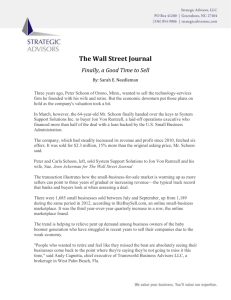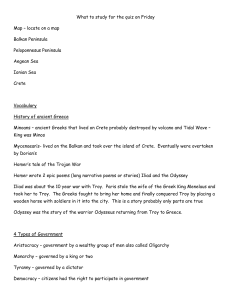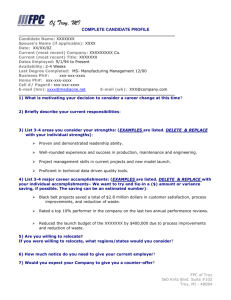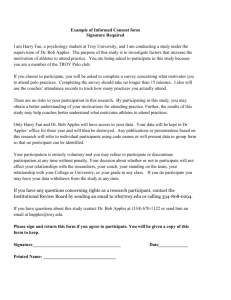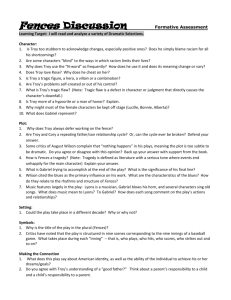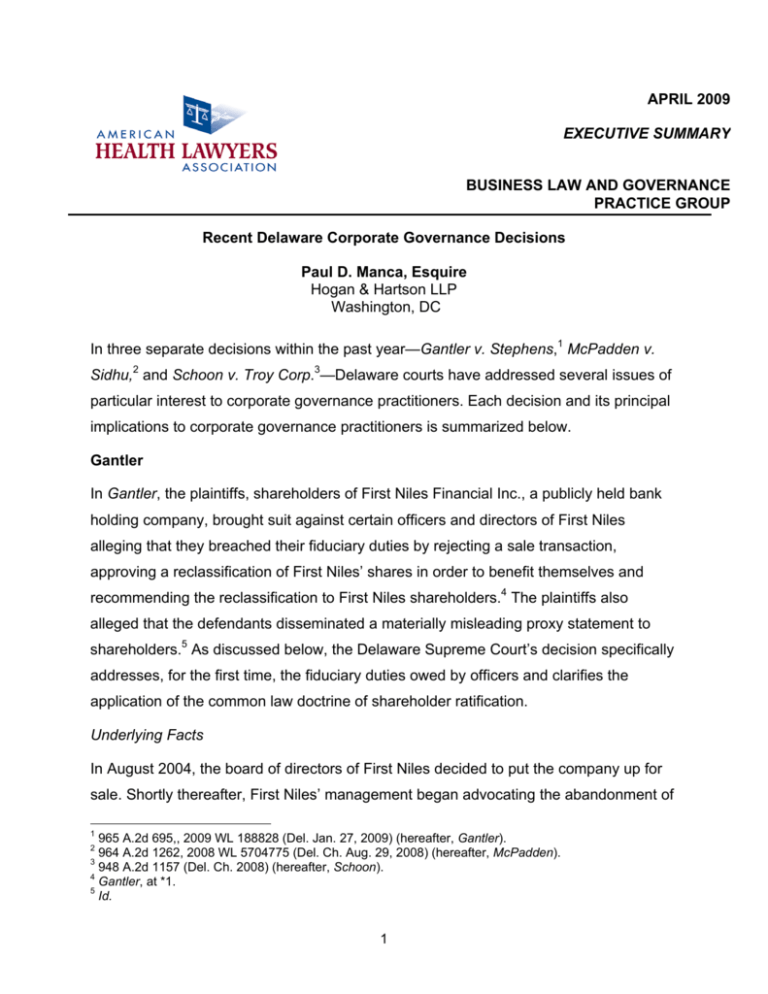
APRIL 2009
EXECUTIVE SUMMARY
BUSINESS LAW AND GOVERNANCE
PRACTICE GROUP
Recent Delaware Corporate Governance Decisions
Paul D. Manca, Esquire
Hogan & Hartson LLP
Washington, DC
In three separate decisions within the past year—Gantler v. Stephens,1 McPadden v.
Sidhu,2 and Schoon v. Troy Corp.3—Delaware courts have addressed several issues of
particular interest to corporate governance practitioners. Each decision and its principal
implications to corporate governance practitioners is summarized below.
Gantler
In Gantler, the plaintiffs, shareholders of First Niles Financial Inc., a publicly held bank
holding company, brought suit against certain officers and directors of First Niles
alleging that they breached their fiduciary duties by rejecting a sale transaction,
approving a reclassification of First Niles’ shares in order to benefit themselves and
recommending the reclassification to First Niles shareholders.4 The plaintiffs also
alleged that the defendants disseminated a materially misleading proxy statement to
shareholders.5 As discussed below, the Delaware Supreme Court’s decision specifically
addresses, for the first time, the fiduciary duties owed by officers and clarifies the
application of the common law doctrine of shareholder ratification.
Underlying Facts
In August 2004, the board of directors of First Niles decided to put the company up for
sale. Shortly thereafter, First Niles’ management began advocating the abandonment of
1
965 A.2d 695,, 2009 WL 188828 (Del. Jan. 27, 2009) (hereafter, Gantler).
964 A.2d 1262, 2008 WL 5704775 (Del. Ch. Aug. 29, 2008) (hereafter, McPadden).
3
948 A.2d 1157 (Del. Ch. 2008) (hereafter, Schoon).
4
Gantler, at *1.
5
Id.
2
1
the sale process in favor of a privatization transaction. The sale process continued,
however, resulting in bids from three potential purchasers. The board subsequently
directed its financial advisor and management to conduct due diligence in connection
with a possible transaction with two of the bidders. However, one bidder withdrew its bid
after management failed to furnish requested due diligence materials. The other bidder,
First Place Financial Corp., eventually received diligence materials and submitted
several revised bids, the last of which represented a significant premium over the
market price of First Niles’ common stock. The First Niles board ultimately rejected this
offer without discussion or deliberation.6
The First Niles board subsequently voted to proceed with a privatization plan proposed
by management. The privatization plan contemplated, among other things, a
reclassification of existing shares of holders of 300 or fewer shares of First Niles
common stock into a new issue of non-voting preferred stock. In June 2006, the First
Niles board approved the privatization plan and filed a proxy statement with the
Securities and Exchange Commission seeking shareholder approval of amendments to
the First Niles certificate of incorporation to implement the reclassification. The proxy
statement included, among other things, disclosure that, after “careful deliberations,” the
First Niles board had determined that the offer it had received was not in the best
interests of the company or its shareholders. The reclassification was approved by First
Niles’ shareholders in December 2006.7
Decision and Analysis
The Court of Chancery had granted the defendant’s motion to dismiss.8 The Delaware
Supreme Court found that the chancery court erroneously dismissed plaintiff’s complaint
and reversed the court of chancery’s decision as to all counts.9
In Gantler, the Delaware Supreme Court for the first time expressly held that officers
owe the same fiduciary duties as corporate directors.10 While not a surprise, the
supreme court’s confirmation of the fiduciary duties owed by officers had not previously
6
Id. at *2-*3.
Id. at *3-*5.
8
Gantler v. Stephens, 2008 WL 401124 (Del. Ch. Feb. 14, 2008) (unpublished opinion).
9
Gantler, at *14.
10
Id. at *9.
7
2
been addressed by the court.11 The court concluded that the plaintiffs had alleged
sufficiently detailed acts of wrongdoing by the defendants to state a cognizable claim
that the defendants acted disloyally.12 The court noted in particular the plaintiffs’
allegations that the officer defendants sabotaged the diligence process and that at least
a majority of the director defendants rejected the First Place bid to preserve personal
benefits, including retaining their positions and pay, as well as personal interests
through outside business relationships with First Niles that would likely have ended
upon a sale to a third party.13 The court concluded that because a claim of disloyalty is
subject to the higher “entire fairness” standard of review, the court of chancery erred in
determining that the defendants’ actions were entitled to protection under the business
judgment rule.14
Gantler is also noteworthy for its discussion of the common law doctrine of shareholder
ratification.15 The court of chancery originally dismissed the plaintiffs’ third count, which
alleged that the defendants breached their duty of loyalty by recommending the
reclassification to shareholders for purely self-interested reasons on the ground that a
disinterested majority of the shareholders had “ratified” the reclassification by voting to
approve it.16 Noting prior confusion regarding the appropriate application of the common
law doctrine of shareholder ratification, the court held that the doctrine “must be limited
to its so-called ‘classic’ form; that is, to circumstances where a fully informed
shareholder vote approves director action that does not legally require shareholder
11
“In the past, we have implied that officers of Delaware corporations, like directors, owe fiduciary duties
of care and loyalty, and that the fiduciary duties of officers are the same as those of directors. We now
explicitly so hold.” Id. The Court of Chancery had previously concluded that officers and directors owed
the same fiduciary duties. See, e.g., Ryan v. Gifford, 935 A.2d 258, 266 (Del. Ch. 2007). This was not in
dispute in Gantler. Gantler, at *9.
12
Id. at *8-*9.
13
The court also remarked that the proxy itself disclosed that certain directors had conflicts of interest
because they were in a position to structure the reclassification in a way that benefits them differently. Id.
at *8.
14
Under Delaware law, the business judgment rule is “a presumption that in making a business decision
the directors of a corporation acted on an informed basis, in good faith and in the honest belief that the
action taken was in the best interests of the company.” Aronson v. Lewis, 473 A.2d 805, 812 (Del. 1984)
(internal citations omitted). The court in Gantler noted that a cognizable claim of disloyalty rebuts the
business judgment rule. Gantler, at *9.
15
The common law doctrine of shareholder ratification is different from an approving vote of disinterested
shareholders with respect to interested director transactions under 8 Del. Code § 144.
16
Id. at *12.
3
approval in order to become legally effective.”17 The court then held that the shareholder
ratification doctrine was inapplicable in this case because a shareholder vote to approve
the reclassification was required.18 The court also clarified that with one exception, the
“cleansing” effect of a ratifying vote is to subject the challenged action to business
judgment review, as opposed to extinguishing the claim altogether, and overruled Smith
v. Van Gorkom19 “[t]o the extent that Smith v. Van Gorkom holds otherwise.”20
Finally, as to the plaintiffs’ claim regarding allegedly misleading proxy disclosure, the
supreme court reversed the court of chancery, refusing to conclude (as the court of
chancery had) that, at as a matter of law, the “careful deliberations” proxy disclosure
would not alter the total mix of information provided to shareholders.21
McPadden
McPadden involved a derivative claim brought on behalf of i2 Technologies Inc., in
connection with the June 2006 sale of Trade Services Corporation (hereafter, TSC), a
division of i2 Technologies. The plaintiff alleged that i2 Technologies’ board of directors
and then-vice president, Anthony Dubreville, breached their fiduciary duties to
shareholders by approving the sale of TSC to a management team led by Dubreville for
a price that the directors knew to be well below TSC’s market value.22 The plaintiff also
alleged unjust enrichment against Dubreville. As discussed below, the court’s decision
addresses the distinction between gross negligence and bad faith in the context of an
exculpatory charter provision limiting director liability.
Underlying Facts
In December 2004, the i2 Technologies board decided to sell TSC. Even though
Dubreville had previously discussed the possibility of leading a management buyout of
17
Id. at *13 (emphasis in original). The court also concluded that the alleged claims that the proxy
disclosure contained a material misrepresentation precluded a determination that, as a matter of law, the
shareholders were fully informed when they voted. Id.
18
Id. at *14.
19
488 A.2d 858 (Del. 1985).
20
Gantler, at *13 n.54. The court noted that a situation where the directors lacked the authority to take
action that was later ratified by shareholders is the only situation where shareholder ratification
extinguishes a claim. Id.
21
Id. at *11-*12.
22
Dubreville was CEO and president of TSC when it was acquired by i2 Technologies, and remained in
charge of TSC after the acquisition. McPadden, at *1.
4
TSC, the board allowed Dubreville to conduct the sale process. The board’s investment
banker provided two preliminary valuations of TSC—both of which were based on
projections created by TSC management under Dubreville’s direction. Dubreville
ultimately used the second set of projections, which were significantly lower than the
first set, to solicit bids.23
The sale process resulted in three bids, including a $3 million bid from the Dubreville-led
group.24 Even though one TSC competitor had offered to acquire TSC for $25 million in
January 2003—a fact known to Dubreville and at least some of the directors—neither
this competitor nor any other TSC competitor was contacted during the sale process.25
In April 2005, the i2 Technologies board approved the sale of TSC to the Dubreville-led
group for $3 million. Shortly after completing the sale, the Dubreville-led group offered
to sell TSC to the competitor who had offered to buy TSC in 2003. That sale did not
occur, but TSC was sold two years later to another competitor for more than $25
million.26
Decision and Analysis
The defendants filed a motion to dismiss the complaint. As discussed below, the court
granted the motion to dismiss as to the director defendants based on the exculpatory
provision in i2 Technologies’ certificate of incorporation, but denied the motion to
dismiss as to defendant Dubreville.27
As an initial matter, the court found that the plaintiff had pled particularized facts
demonstrating that the board was grossly negligent in its oversight of the sale process.28
The court noted in particular the board’s decision to allow Dubreville to run the sale
process knowing his interest in purchasing TSC. The court also noted that direct
competitors were never contacted and that the use of projections provided by TSC
23
Id. at *3-*4.
Of the other two bids, one bid was valued at $4.3 million and the other bid was for $1.8 million. Id. at *4.
25
TSC had filed a lawsuit against the competitor in 2002 for copyright infringement, which lawsuit was
settled in mid-2004. Id. at *2.
26
Id. at *5-*6.
27
Id. at *11.
28
Id. at *9.
24
5
management at a time when TSC management was a prospective buyer should have
alerted the board to carefully consider whether Dubreville’s offer was high enough.29
Despite this finding, however, the court granted the motion to dismiss in favor of the
director defendants based on the exculpatory provision in i2 Technologies’ certificate of
incorporation. Under 8 Del. Code § 102(b)(7), a corporation may include in its certificate
of incorporation an exculpatory provision that limits the personal liability of directors for
breaches of fiduciary duties, including breaches of the duty of care. The i2 Technologies
certificate of incorporation contained such a provision.30 However, a Section 102(b)(7)
exculpatory provision cannot limit liability for breaches of the duty of loyalty, including
bad faith conduct.31 The court reaffirmed that gross negligence and bad faith conduct
are not synonymous, and concluded that the plaintiff had not sufficiently alleged that the
director defendants had acted in bad faith through a conscious disregard for their
duties.32 Since liability for gross negligence was exculpated under i2 Technologies’
certificate of incorporation, the court granted the motion to dismiss as to the director
defendants.33 The court noted, however, that Dubreville was not entitled to the
protections afforded by the exculpatory provision in i2 Technologies’ charter because he
was not a director.34
McPadden illustrates the significance of the previously recognized distinction between
gross negligence (duty of care) and bad faith (duty of loyalty), particularly as it relates to
exculpation of director liability under a Section 102(b)(7) exculpatory provision. The
decision also highlights the distinction between director and officer liability exposure for
breaches of fiduciary duties because officers cannot avail themselves of a Section
29
Id. at *7-*8.
Id. at *9.
31
Under 8 Del. Code § 102(b)(7), such a provision cannot eliminate or limit liability for, among other
things, “any breach of the director's duty of loyalty to the corporation or its stockholders” or “acts or
omissions not in good faith or which involve intentional misconduct or a knowing violation of law.”
32
McPadden, at *9-*10 (citing In re Walt Disney Co. Derivative Litig., 906 A.2d 27, 66 (Del. 2006), which
noted, among other things, that only “the intentional dereliction of duty or the conscious disregard for
one’s responsibilities” must be treated as “non-exculpable, non-indemnifiable violation of the fiduciary
duty to act in good faith”).
33
Id. at *10.
34
Id. (noting that “an officer does not benefit from the protections of a Section 102(b)(7) exculpatory
provision, which are only available to directors”).
30
6
102(b)(7) exculpatory provision even though, as discussed above, officers owe the
same fiduciary duties as corporate directors.
Schoon
In Schoon, the plaintiffs, a former director and a current director of Troy Corporation,
brought suit against Troy seeking advancement of expenses in connection with
defending various claims asserted by Troy against the plaintiffs in multiple actions. As
discussed below, the court’s holding seems to undercut the protections commonly
thought to have been afforded to former directors under mandatory advancement of
expense and indemnification provisions in corporate bylaws.
Underlying Facts
The plaintiffs were William Bohnen, a former director, and Richard Schoon, a current
director, of Troy. Bohnen and his family were major stockholders of Troy, primarily
through Steel Investment Company. Bohnen served as Steel’s board designee until
February 2005, at which time Bohnen resigned and Schoon (a longtime financial
consultant to Steel and the Bohnen family) was elected to replace Bohnen on the Troy
board of directors.35
In January 2004, Steel decided to sell its interest in Troy. Both Steel and Schoon made
books and records demands on Troy under 8 Del. Code § 220. Unsatisfied with Troy’s
response, in September 2005 Schoon filed an action against Troy in the court of
chancery under 8 Del. Code § 220 (hereafter, the Schoon Action). In its answer, filed in
October 2005, Troy alleged that Schoon, in breach of his fiduciary duties, planned to
share with Steel and other third-parties any document he might receive from Troy.36
35
Schoon, at 1160. After Mr. Bohnen passed away, the executrix of his estate was substituted in his
place. Id.
36
Id. at 1160-61. Steel subsequently filed a separate 8 Del. Code § 220 action against Troy and, on
November 9, 2005, Schoon’s and Steel’s actions were consolidated by the court. Id.
7
In November 2005, the Troy board (excluding Schoon) approved amendments to the
Troy bylaws, including removal of the word “former” from its definition of the directors
entitled to advancement of legal fees and expenses.37
In January 2006, Troy attempted to countersue Schoon in the Schoon Action asserting
breach of fiduciary duty claims against Schoon and Bohnen, among other things. The
court of chancery denied Troy’s motion, and in February 2006, Troy filed a plenary
action (hereafter, the Troy Action) against eight defendants, including Schoon and
Bohnen, asserting the same fiduciary duty claims it attempted to raise as counterclaims
in the Schoon Action.38
Schoon and Bohnen, through their counsel, requested advancement of fees and
expenses under the mandatory advancement provision in Troy’s bylaws to defend
against the breach of fiduciary duty claims alleged by Troy (with respect to both the
Schoon Action and the Troy Action). The Troy board created a committee to review and
consider the requests for advancement. The committee subsequently recommended
approval of a fraction of the amounts Schoon and Bohnen sought to be advanced.
Schoon and Bohnen then filed this lawsuit.39
Decision and Analysis
Ruling on cross-motions for summary judgment, the court concluded that Schoon was
entitled to advancement of expenses, but that Bohnen was not entitled to any additional
advancement of expenses under Troy’s amended bylaws.40
With respect to Bohnen, the court concluded that the November 2005 bylaw
amendments removed Bohnen’s right to further advancement of requested expenses.41
The court noted in particular that Bohnen was not named as a defendant at the time the
bylaw amendments were approved nor was there evidence indicating that, at that time,
Troy was “even contemplating claims against Bohnen.”42 As a result, the court
37
Id. at 1161.
Id. at 1161-62.
39
Id. at 1162-63.
40
Id. at 1177.
41
Id. at 1168. Troy had previously advanced a portion of the expenses to Bohnen in connection with
Bohnen’s defense of Troy’s effort to bring counterclaims against Bohnen in the Schoon Action. Id. at 1163.
42
Id. at 1165-66.
38
8
concluded that Bohnen did not have a vested right to advancement of the requested
expenses before the Troy bylaws were amended.43
In reaching this conclusion, the court distinguished the decision of the Delaware
Superior Court in Salaman v. National Media Corp.44 In Salaman, the defendant
corporation began advancing expenses with respect to a pending claim against a former
director, but then amended its bylaws to repeal the basis for the advancement.45 The
court in Salaman held that the former director’s right to advancement was a contract
right, which vested (and could not thereafter be unilaterally terminated) when the
advancement obligation was triggered – i.e., the date the claim was filed against the
former director.46 The court in Schoon concluded, however, that the timing of the
assertion of the claim was a key factor that distinguished the situation in Salaman from
Bohnen’s situation.47
Finally, the court held that Schoon was entitled to advancement, including with respect
to expenses incurred in defending the fiduciary duty counterclaims asserted by Troy in
the Schoon Action after the court denied Troy’s request to amend its answer in the
Schoon Action.48
The court’s decision in Schoon came as a surprise to many practitioners who viewed
advancement and indemnification rights under corporate bylaws as vested contract
rights that could not be unilaterally terminated. The adverse impact of this decision,
however, may be relatively short-lived. In March 2009, proposed amendments to the
Delaware Code were submitted to the Delaware state legislature, including a proposed
amendment to 8 Del. Code § 145(f) to address the decision in Schoon.49 This
amendment is designed to clarify that a right to indemnification or advancement of
expenses under a charter or bylaw provision cannot be eliminated by an amendment
after the occurrence of the act or omission to which indemnification or advancement
43
Id. at 1166-67.
1992 WL 808095 (Del. Super Ct. Oct. 8, 1992) (hereafter, Salaman).
45
Salaman, at *6.
46
Id.
47
Schoon, at 1166.
48
Id. at 1170. The court also awarded Schoon prejudgment interest and partial reimbursement for costs
incurred in enforcing Schoon’s rights to advancement, but refused to award attorneys’ fees. Id. at 1173,
74 and 1176-77.
49
H.R. 19, 145 Gen. Assem., Reg. Sess. (Del. 2009).
44
9
relates (unless the provision contains an explicit authorization of such elimination at the
time of the act or omission). If approved by the Delaware state legislature, this
amendment is expected to become effective on or about August 1, 2009.
Recent Delaware Corporate Goverance Decisions © 2009 is published by the American Health
Lawyers Association. All rights reserved. No part of this publication may be reproduced in any form
except by prior written permission from the publisher. Printed in the United States of America.
Any views or advice offered in this publication are those of its authors and should not be construed as the
position of the American Health Lawyers Association.
“This publication is designed to provide accurate and authoritative information in regard to the subject
matter covered. It is provided with the understanding that the publisher is not engaged in rendering legal
or other professional services. If legal advice or other expert assistance is required, the services of a
competent professional person should be sought”—from a declaration of the American Bar Association
Copyright 2009 American Health Lawyers Association, Washington, D.C. Reprint permission granted.
Further reprint requests should be directed to:
American Health Lawyers Association
1025 Connecticut Avenue, NW, Suite 600
Washington, DC 20036
(202) 833-1100
For more information on Health Lawyers content, visit us at www.healthlawyers.org.
10


